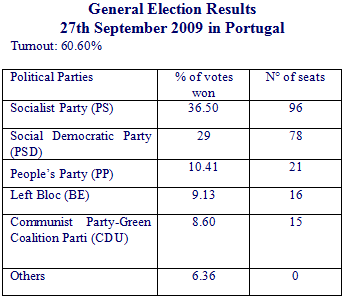News
Corinne Deloy,
Fondation Robert Schuman,
Helen Levy
-

Available versions :
EN

Corinne Deloy
Fondation Robert Schuman
Helen Levy
Outgoing Prime Minister Jose Socrates' Socialist Party won the general elections in Portugal on 27th September. He won 36.50% of the vote and 96 seats (-25 in comparison with the previous election on 20th February 2005) against 29% (78 seats, +3) for the main opposition party, the Social Democratic Party (PSD) led by Manuela Ferreira Leite, which achieved one of the poorest results in its history. This decline was to the advantage of the People's Party (PP) led by Paulo Portas which recorded healthy progress and came 3rd with 10.41% of the vote (21 seats, +11). The parties on the left confirmed their breakthrough seen in the European elections in June. The Left Bloc (BE) led by Francisco Louca won 9.13% of the vote (16 seats, +8) and the Communist Party-Green Coalition led by Jeronimo de Sousa won 8.60% (15 seats, -1).
Turnout was the lowest ever recorded in Portugal. It rose to 60.60% ie -3.66 points in comparison with the general election on 20th February 2005.
"We have been chosen to govern Portugal again. It is an extraordinary, unambiguous victory," stressed Prime Minister Jose Socrates. "The Socialist Party won a clear, unequivocal victory in difficult circumstances," said Labour Minister Jose Vieira da Silva.
The PS focused its electoral campaign on the need to employ public spending to boost the economy that has been sorely affected by the international crisis and to counter unemployment via the implementation of several structural reforms. Jose Socrates also defended his policy of budgetary rigour saying that this "had made it possible to modernize the country and to withstand the crisis better." But because it does not have the absolute majority the PS will however have to form a coalition government and come to agreements with the PSD, - depending on the issue in hand – for example with regard to public finance - or with the left parties with regard to social measures.
When interviewed on the formation of a coalition excluded before the general elections both by the PSD and the far left, Jose Socrates answered that it was "too early to talk about this" and stressed that the new Prime Minister had to be appointed by Anibal Cavaco Silva (PSD), President of the Republic first of all. "Then I shall consult all of the parties in parliament and this is in line with what the Portuguese people wants," he concluded.
"The electorate seem to favour government stability in the face of an opposition that hardly presented a convincing alternative," indicated political analyst Pedro Magalhaes just before the election. "Portugal is finally returning to "political normality" with an electorate which has dispersed itself amongst five major parties. The circumstances that led the PS to the absolute majority in 2005 could not really be repeated," stresses Rui Oliveira Costa, an analyst from Eurosondagem.
Aged 52 Prime Minister Jose Socrates, who comes from Porto, is an engineer. A member of the PS since 1981, he was elected to Parliament in 1987 and notably distinguished himself by his defence of consumer rights. In 1988, the weekly L'Expresso qualified him as "the best new MP in the country". After becoming the PS's national secretary in 1991 Jose Socrates was appointed Secretary of State for the Environment Minister four years later, then Deputy Minister to the Prime Minister in Antonio Gutteres's government (PS) responsible for Youth, Sport and the Fight against drugs. Appointed Urban Development Minister in 1999 he succeeded in winning Portugal's appointment as organizer country for the European Football Championship in 2004. The following year he was appointed Prime Minister after victory by the PS in the general elections on 20th February 2005.
Jose Socrates who has led by the country for the last four years has helped to take Portuguese society forwards, notably by pushing through a law to abolish the ban on abortion and by defending homosexual marriage. During his term in office he has implemented an austerity policy undertaking cuts in certain social budgets, continuing privatisations and implementing unpopular measures such as a rise in VAT, the freezing of civil servants' careers and even raising the retirement age. Although he has achieved his goals in part ie restabilising public finance, the international economic crisis has unfortunately almost reduced the work done in Portugal over the last three years to zero.
Portugal has seen a number of minority governments. Only one (led by Socialist Antonio Guterres 1995-1999) has succeeded in reaching the end of its mandate since the Carnation Revolution on 25th April 1974 (which led to the fall of the dictatorial regime established in 1932 by Antonio Oliveira Salazar) and the return of Portugal to democracy. "The country is facing serious challenges. This term in office deserves stability," declared Jose Socrates just after the announcement of the results. The Prime Minister promised to make employment the priority of his future government. Unemployment totals 9.1% of the working population, the highest it has been in 23 years.
 Source : Electoral Commission of Portugal
Source : Electoral Commission of PortugalOn the same theme
To go further
Elections in Europe
Corinne Deloy
—
28 January 2025
Elections in Europe
Corinne Deloy
—
14 January 2025
Elections in Europe
Corinne Deloy
—
3 January 2025
Elections in Europe
Corinne Deloy
—
17 December 2024

The Letter
Schuman
European news of the week
Unique in its genre, with its 200,000 subscribers and its editions in 6 languages (French, English, German, Spanish, Polish and Ukrainian), it has brought to you, for 15 years, a summary of European news, more needed now than ever
Versions :


